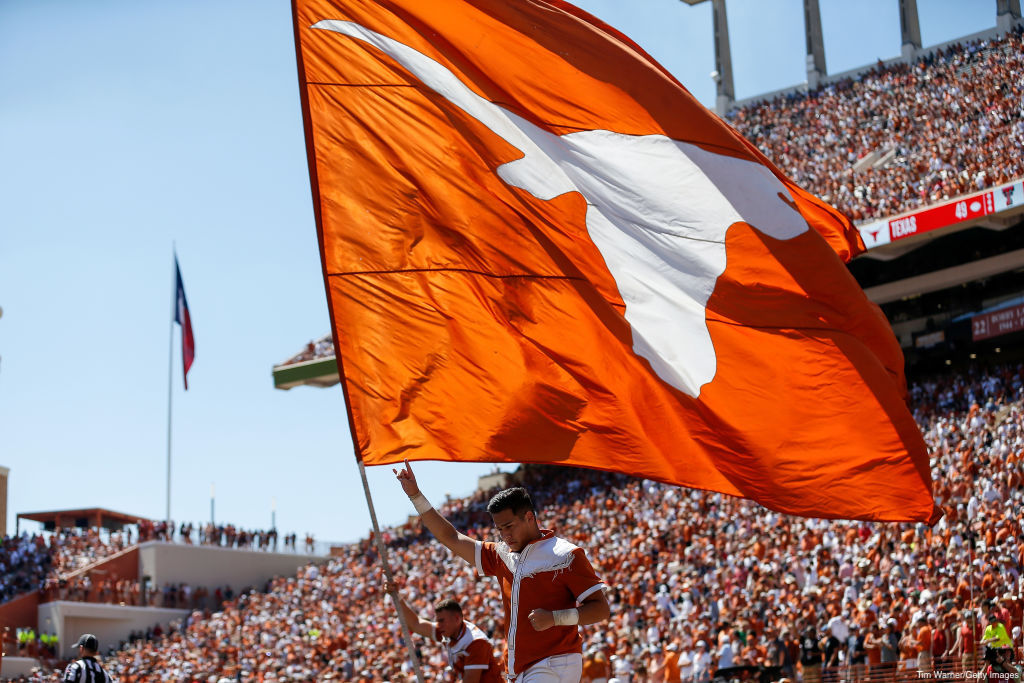In 1996 the Astroturf which had applied countless world-class strawberries to the Longhorns’ finest since 1969 was replaced by natural grass in Texas Memorial Stadium. Also in 96, the first generation of our beloved Jumbotron was installed. The seating structure and amenities remained basically the same way they had been since the early seventies with a seating capacity of approximately 80,000. There was one other change to the stadium though 1996. It was re-christened Darrell K. Royal-Texas Memorial Stadium. That’s quite a mouthful and leads me to wonder: the next time they rename the stadium how are they going to do it? I think I prefer Darrell-Mack Brown Royal-Memorial Stadium to Darrell K Royal Mack Brown-Texas Memorial Stadium but I’m open to suggestions.
The readers of these pages know that no one is about to nominate me for the presidency of the Mack Brown Fan Club. And in the wake of the unmitigated disaster of the 2010 season: a season where, if you add up all his comments during and after, you have to conclude that Mack Brown took the year off feeling sorry for himself, I have spent much time reflecting on Mac Brown’ s career at Texas. And even after 2010, if you compare the accomplishments and the contributions of Darrell Royal and Mack Brown I have concluded that Brown should be held in as high a regard as Royal in the history of Texas Football. Brown is to Royal as Lincoln is to Washington. Lincoln preserved the Union, Brown not only preserved but resurrected and enhanced the glorious winning Hook Em tradition of Texas Football.
It seems so obvious now but it really was the unique genius of Mack Brown that—unlike Fred Akers and John Mackovic before him—he figured out the way to start re-building Texas football was to bathe himself, the players, alumni, and fans in the rich glorious tradition of Darrell Royal’s Texas Football. Mack reminded everyone of the great history and tradition of Texas Football and made the Texas faithful proud and excited about the Longhorns after a 4-7 season and before the first snap had been taken in 1998. Whereas Akers and Mackovic were compelled by the ego to distance themselves from the Darrell Royal legacy, Brown saw Royal’s legacy as something to embrace, as shoulders he could stand on top off. He recognized that the magic of Royal’s legacy could be leveraged for rebuilding the image of the program in the hearts and minds of the fans, the media and most importantly for recruiting.
Ricky William’s Heisman Trophy in 1998 was a sublime climax to the first year of Brown’s campaign to re-build Texas Football. I use the word campaign purposely as 1998 would showcase Mack Brown as the best marketing and public relations professional in college football. Ricky Williams certainly deserved to win the Heisman Trophy but it was Brown who convinced him to stay at Texas for a senior year when it was expected that he would go to the NFL and it was Brown who put the ball in his hands 30 times a game or more seven times in 98 including 44 times against A&M the last game before the final votes were in. Most importantly it was Brown the charismatic salesman who was the frontman and campaign manager for Ricky Williams the Heisman candidate and he was not the least bit coy about promoting Williams as the player most deserving the award. Brown’s skill in marketing and public relations is his greatest strength as a coach and he has used it to stock his football teams with a top-five talent for the past 10 years. It also landed Texas a controversial bid to the Rose Bowl in 2005 which was Brown’s and Texas’ first BCS Bowl bid and was a springboard to the school’s first National Championship in 35 years.
It wasn’t always a bed of roses for Brown between 1998 and the National Championship 2005 season. The very first game of the 1999 season exposed some of Brown’s greatest weaknesses as a coach. North Carolinas St. blocked three Texas punts, returning two of them for touchdowns and upset a Texas in their home opener 23-20. Special teams have always seemed like an afterthought for Brown. Every year he’s been at Texas there has been glaring weaknesses in the kicking game. Lack of a kicker who consistently produces touchbacks and terrible kick-off coverage have been a hallmarks of Brown’s Texas teams. Game planning and game-day adjustments have also been average at best and it showed in that first game of 1999. How could you not make adjustments to prevent more than one blocked punt in a game?
Then there was the Chris Simms era which highlighted Brown’s tendency to coddle players and earned Texas a reputation of having a country club atmosphere and for being a soft team. Remember the infamous press conference where Brown curtly answered a question that was directed to Chris Simms. This coddling reached a climax in the 2001 Big 12 Championship game when Brown didn’t yank Simms in favor of Major Applewhite until he had thrown 3 interceptions and fumbled once all in the first half digging to deep a hole for Texas to climb out of. A win would have put Texas in the National Championship game. Then there was Brown’s phone call to the Texas season ticket holder rebuking him for publicly criticizing Brown in comments to a New York Times reporter revealing his over-sensitivity to criticism.
Another thorny issue for Brown was a five-game losing streak against Oklahoma with two especially humiliating losses, in 2000, 63-14 and in 2003, 65-13. Critics said the game plans were too conservative, unimaginative and looked like Brown was playing not lose instead of playing to win. In 20001 freshmen Cedric Benson didn’t see the field in a game where Texas failed to score a touchdown. Evidently Brown thought the Oklahoma game was too big a stage for a freshman. Benson started the next game and as they say, the rest is history. Amazingly Cedric Benson, Roy Williams, and B.J. Johnson never scored a touchdown and never tasted victory in a Texas-OU game.
Entwined in all of Brown’s controversies at Texas was Greg Davis. I think the calls for the firing of Greg Davis started all the way back in 2000. I found it ironic to hear people screaming at Greg Davis during games in Memorial Stadium. I didn’t know who Greg Davis was until fans started calling for his head. When I found fault with coaches I was thinking Mack Brown while most others were thinking Greg Davis. I guess people just couldn’t bring themselves to be directly critical of the charismatic Mack Brown. Brown was steadfast in defending Greg Davis no matter how many sideways passes were thrown time and time again calling Davis the best in the country. Davis survived long enough to have Vince Young run his offense winning Texas a National Championship and an Offensive Coordinator of the year award for Davis in 2005.
Despite these issues, the first six years of Brown’s tenure at Texas produced 60 wins and the beginning of a streak of nine seasons with 10 or more wins unmatched by any other team in the country during that time span. During those first six years, Brown laid the foundation for Texas to become one of the elite programs in college football in a class that only includes Florida, USC, Alabama, Oklahoma and LSU in my opinion. It’s getting boring and repetitive but I will mention that because of Brown’s football program Texas is number one in revenue generated by a college athletic program. Voila, the Longhorn Network.
How ironic for the Longhorn Network to premiere on the heels of a 5-7 season, Brown’s nadir at Texas. I think the 2010 team was the perfect storm of all the weaknesses of Brown’s program. The team was soft, there was little accountability for players or coaches and the game plans were bland, to say the least. The first three offensive plays for Texas in the Oklahoma game encapsulated almost all of the criticisms heaped on Brown during his career at Texas. First down, sideways pass completed for a loss of two yards. Second down, a sideways pass completed for a loss of 2 yards. Third down and 14 to go, a 7-yard completion to the tight end. Soft, unimaginative, afraid and playing not to lose against Oklahoma.
Mack Brown cleaned house after the 2010 season and rightfully so. The house cleaning swept away Greg Davis, Browns running mate since his days at North Carolina, the lightning rod for criticism of the program and the man who Brown called the best offensive coordinator right up until the time he fired him. Brown has never publicly said a word about the end of his coaching relationship with Greg Davis.
2011 is critical year not only for the Texas Football program but for Mack Brown’s career, his legacy at Texas and how he will be remembered. Will 2011 be the beginning of another run of 10 win seasons, BSC Bowls and possibly Brown’s second National Championship? Or will it be the beginning of the last chapter of his career-ending like Bobby Bowden’s at Florida St. where he stayed too long, ending sadly and without dignity. There’s an old vaudeville expression. – A good performer knows when to leave the stage, satisfying them and then departing with them wanting just a little bit more.


